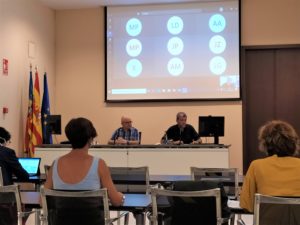
The analyst from the Institute for International Economics (IIE) points out that the recovery fund approved by the EU has to be the first step towards a sustained and sustainable long-term recovery project
The Valenciaport Economic Report estimates the impact of the Covid-19 crisis on the world economy at $12 billion, which is equivalent to the combined GDP of Germany, France, Italy and Spain. This is the largest drop in economic activity in peacetime
The report says the key to economic recovery is to see what families do: save or consume
Valenciaport forecasts an overall decrease in traffic this year of around 10% and expects a normalisation in the movement of goods in the second half of the year
The first days of July show an improvement in the export traffic managed by Valenciaport, which marks a slight recovery in activity
“The Recovery Fund approved by the EU deserves a “remarkable” for Spain. On the one hand, it is excellent because it maintains the figure of 750,000 million euros for aid to the countries most affected by the Covid-19 crisis, which includes up to 390,000 million in direct aid that will benefit Spain, but on the other hand it is insufficient for a sustained and sustainable European project in the long term. It is a first step, the next one has to be included in the community budget for the next seven years”, explained Vicente Pallardó, analyst of the economic situation of the Institute of International Economy (IIE), who today presented, together with Aurelio Martinez, president of the Port Authority of Valencia, the quarterly report April-June 2020 of Global Economic Environment that he prepares for the Valenciaport Foundation and the Port Authority of Valencia (PAV).
During the presentation, both Martínez and Pallardó stressed that the quantification of the impact that the Covid-19 crisis has caused in the world economy is 12 billion dollars, which is equivalent to the joint GDP of Germany, France, Italy and Spain. “This is the biggest drop in economic activity in times of peace. We are facing the greatest fiscal and monetary expansion in history,” said Pallardó. In this sense, it is worth noting that this crisis has triggered public debt to historical highs as stated in the report, up to 120% of GDP in Spain, up to 140% in the U.S. or up to 160% of GDP in Italy. A situation that in the long term may be unsustainable and generate distortions.
In this line, the IIE analyst who is carrying out the report for the APV points out that Europe needs to grow adequately based on a long-term plan. “The Recovery Fund is not enough, it must be a first step towards a more ambitious project for Europe,” said Pallardó. The report also points out some of the keys to stability in Spain, which include the recovery of fiscal balance. To this end, the analyst of the IIE and collaborator of the PAV points out “the need for rationalization of spending, the closing of tax loopholes so that all companies contribute just enough to the Spanish coffers and, as something fundamental, to end the underground economy. Spain is still at the same level of underground economy since 34 years ago, when we entered the EU. It is an unsupportive economy that we have to reduce, just as the Netherlands has to close the tax loopholes for companies that want to pay less tax. Everyone in the EU has duties to fulfil. Another of the key factors pointed out by the Economic Environment Report of the PAV and the Valenciaport Foundation is that the debt generated by the Covid-19 should be converted into perpetual debt, which would be more bearable in the current situation of low interest rates; given that there would be interested investors who would guarantee its placement in the market”.
Recovery depends on private activity
The Quarterly Economic Environment Report also covers how the different States are acting to tackle the Coronavirus crisis. Thus, countries have injected funds into their economies through direct aid that generates greater expenditure, as countries such as the United States and China have done, or through indirect aid with formulas such as preferential loans, acquisition of shares in companies, which mostly European countries have adopted, or by directly injecting money into families.
According to the IIE expert, “however much the public sector does, the key to recovery lies in private activity and in what families do. If there is a lot of uncertainty, the savings rate of families will grow and consumption will be reduced; therefore it is essential to generate confidence and implement measures that stimulate employment and spending. Conditionality and reforms can be good for Spain. For example, it is essential to generate confidence and implement measures that stimulate employment and spending.
Recovery symptoms
During the presentation of the report, Aurelio Martínez, indicated that “in the month of July we began to see a slight improvement in the traffic of goods, especially in exports. If the figures continue in this line in the coming months, the second half of the year will have some standardized traffic. The greatest impact has been in the toughest months of the Covid, (April, May and June) so that traffic estimates for Valenciaport this year may be a drop of around 10%.
The president of the PAV has also valued the lowering of fees in the ports, which will reduce the revenue of Valenciaport but are a stimulus for the business community and support to port companies as it generates liquidity and cost savings. In this sense, the financial support of Valenciaport to Valencian companies to overcome the crisis of Coronavirus would already exceed 60 million euros, between the cash liquidity generated and the reduction of port taxes.

